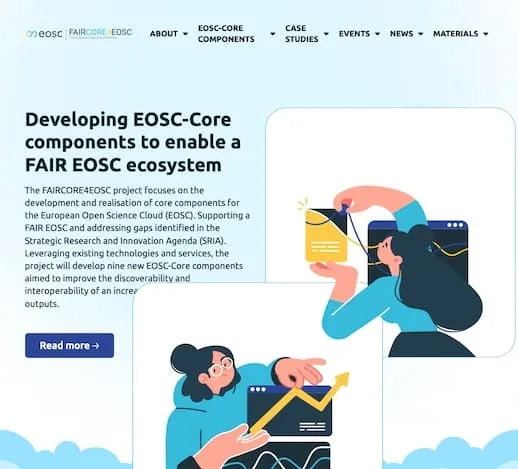A persistent identifier and global registry for identifying, tracking, and sharing research projects
RAiD is designed to address key challenges faced by researchers, research organisations, funders, infrastructure providers, and others in the research ecosystem—maintaining consistent and up-to-date information on projects throughout the research lifecycle.
New to RAiD?
- The Research Activity Identifier (RAiD) is a persistent identifier (PID) and global registry dedicated to research projects.
- RAiD is governed by ISO standard 23527:2022, with the Australian Research Data Commons (ARDC) as the Registration Authority and lead developer of the system.
- RAiD provides a system to store, update, share, and link project information across the research community.
- RAiD facilitates the administration and reporting of project information.
- ARDC and DataCite have partnered to deliver RAiD services.
- RAiD is being integrated with European Open Science Cloud infrastructure via the FAIRCORE4EOSC program.
Unambiguous identification
Provide your research project with a unique persistent identifier tor discovery, reporting, and communication
A global research project registry
Combine all your research project information into standardised RAiD metadata records with multi-party access, a version history, and an automatically generated landing page
Reporting and assessment
Track and report your project's resourcing, inputs, and outputs over time to gain strategic insight into your project’s outcomes or impact
Get RAiD now!
In Australia and New Zealand
- The ARDC is the RAiD Registration Agency for Australia and New Zealand.
- RAiD is offered as a free service within this region, with no cost to organisations or individuals.
- Research organisations can offer RAiD to their staff by signing a Service Schedule with the ARDC, contact us.
- Individual researchers in Australia at organisations that do not yet offer RAiD should ask their Library or Research Office to request access to the RAiD service from the ARDC. We can facilitate this request, contact us.
In Europe
- SURF (Netherlands) is the RAiD Registration Agency for Europe.
- Individual researchers or research organisations should review SURF's RAiD webpage and complete an Expression of Interest form.
Elsewhere (global)
- As the global Registration Authority, the ARDC is committed to the timely rollout of RAiD for all eigible users worldwide.
- At this time, RAiD is offered as a free service, with no cost to organisations or individuals.
- Research organisations located outside Australia, New Zealand, or Europe can offer RAiD to their staff by signing a Service Schedule with the ARDC, contact us.
- Individual researchers outside Australasia or Europe will have direct access to RAiDs. To register your interest, contact us.
Eligibility
- RAiD supports research projects.
- A research project is an endeavour or undertaking that aims to advance knowledge, with a set scope that takes place over a limited (if potentially long) period of time.
- A project is not identical to a grant; a project is something you do, while a grant is something you receive. Identifiers for grants are available from Crossref or DataCite (and may constitute part of a RAiD record).
- RAiDs should not be used for organisations (acquire an ROR instead) or durable organisational units like faculties, departments, or laboratories.
- If you have any questions about the appropriateness of RAiD for your use case, please contact us.
Documentation and support
- Please consult the RAiD documentation.
- RAiD Metadata specification.
- If you require help with RAiD and are an ARDC user, you can open a support ticket by emailing us.
- SURF support information is coming soon.
RAiD's Value
RAiD is a game-changer for the global research community
Projects and activities can now be uniquely identified and tracked across the research lifecycle
RAiD documentationRAiD allows project information to be viewed, shared, managed, and linked to other PIDs globally
RAiD documentationRAiD can be integrated into existing software platforms to eliminate double-entry of information
RAiD documentationWho should use RAiD?
RAiD is designed for use worldwide with project information that can be made public (temporary embargoes are supported)
Research infrastructure providers
Organisations that provide research infrastructure or services such as imaging, HPC, or specialised softare for researchers (and want to track outcomes from this usage)
Funders
Organisations that fund research or research infrastructure (and want to track the outcomes and impact of this funding)
Research organisations
Organisations wishing to identify and track project inputs and outputs (e.g. contributors, collaborators, data sets, samples, instruments, tools, grants, events, grey literature, journal publications, and all associated PIDs)
Researchers
Researchers and research teams wishing to track and share information about their projects
Other PID providers
Other PID providers that want to integrate project PIDs or leverage proect matadata to help build research graphs
Why get a RAiD?
RAiD helps you, your team, and your organisation spend more time doing research and less time managing or administering it. RAiD also opens the research project ‘black box’ exposing key project information, and how it has changed over time, in the interest of transparency and open scholarship.
FAIR, equitable and sustainable access
RAiD incorporates and facilitates FAIR (Findable, Accessible, Interoperable and Reuseable) data principles FAIR
RAiD is open-source and aligned with the Principles of Open Scholarly Infrastructure (POSI)
Provides a globally available project registry with human- and machine-readable project metadata, contributing to the documentation of data and other research outpus.

FAIR RAiD aid for the FAIRCORE4EOSC project
RAiD is being developed to automatically prepare and submit research service applications on behalf of European researchers
The FAIRCORE4EOSC project in Europe is developing an online marketplace for European researchers and collaborators to easily select multiple research services from. These services require an application that grant a researcher access to (e.g.) information stored in a supercomputer or data centre.
RAiD is being used to:
- Store each European project's information as RAiD project metadata
- Provide RAiD metadata access after a research service application has been selected from FAIRCORE4EOSC's online marketplace
- Simultaneously prepare and submit the selected research service applications on behalf of a researcher - via FAIRCORE4EOSC's marketplace system framework
- Provide automatic notification of each research service's approval to the researcher, if no other exceptions apply.
The result? A researcher can receive access notifications from multiple research services within minutes, rather than waiting weeks or months for any reply.
RAiD documentationRAiD Benefits
Get time-saving, stable and persistent RAiDs for your research projects or activities
Integration with existing data management systems allows RAiD to minimise time lost on administrative effort and double-data entry when producing reports, preparing and submitting research service applications, or strategically analysing project impacts and outcomes.

Empower and encourage your research organisation to get RAiD
Customise and control the information your research organisation would like kept and shared for a RAiD project or activity
Accurately store and view RAiD metadata information whenever needed at any stage of a project or activity, including after its closure
Track future funding requirements, project outcomes and changes made over time for a RAiD project or activity
Fast-track project administration and save considerable research time and money
Why RAiD is worth investing in
The ARDC is currently receiving heightened international interest from research organisations keen to learn how they can adopt RAiD into their research activities, or become either a RAiD Registration Agency or a service point.
Worthwhile reasons
Global interest
PID for research projects and activities
Customised use of open RAiD metadata
Intelligent analysis
Key issues that RAiD solves
Research data origination
Monitoring project activities
Minimising errors
Want to know more?
Go to our RAiD Documentation site and then contact us with your RAiD questions .
